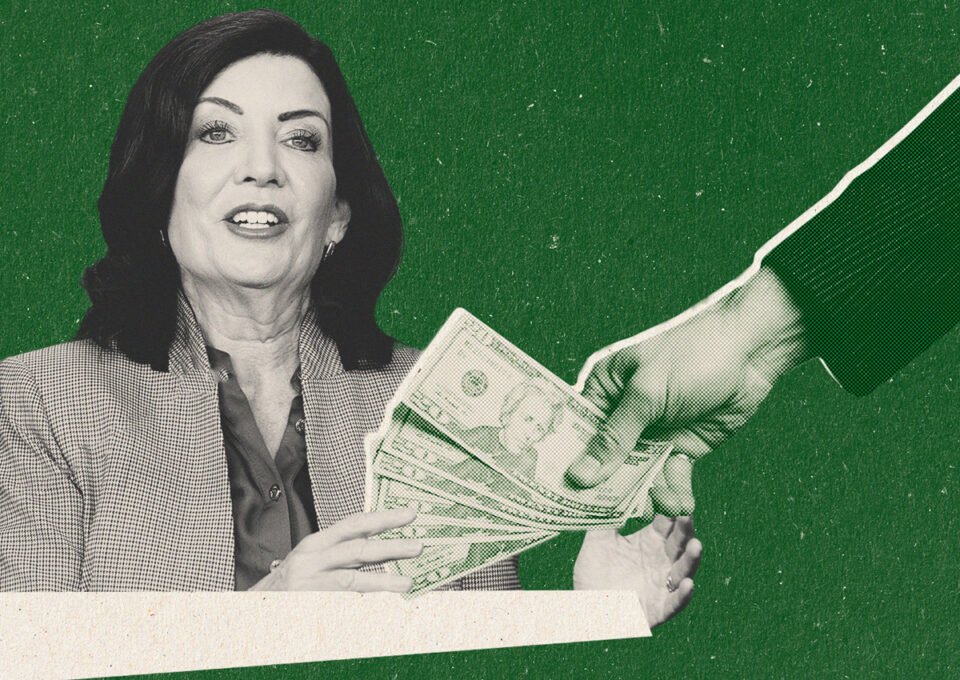Consider the headline: “Hochul, state Democrats campaigns buoyed by real estate money.”
And this one: “Only 11% of donations for Hochul, Dems came from real estate.”
The Albany Times Union, an excellent and essential newspaper in New York, used the first headline and not the second, based on its analysis of campaign contributions to Gov. Kathy Hochul and the state Democratic Party organization.
The Times Union didn’t sensationalize the article itself. Nonetheless, the story reinforces the belief of real estate’s enemies that elected officials are in the industry’s pocket because of its donations to their campaigns.
But the reality is that just $1 million of the $9 million raised by Hochul and the state Democratic Party in the past six months was from real estate. What about big donors? Of the $18,000 checks (the legal limit) Hochul got during that period, less than one-third came from real estate.
That’s substantial, but not disproportionate to the size of the industry and the role that the state government plays in its welfare.
So, given that context, what does real estate actually reap from its perceived largesse?
Contributions enhance access. Pay $1,000 and you can get cocktails and a few minutes of facetime with an elected official. For $5,000, you can take a photo with one to impress clients or potential business partners. Fork over $10,000 and you’ll get your calls returned.
Want a seat on an advisory panel? Kick in a little more. Or a lot more, if you fancy a board with real authority.
But beyond that, donations don’t guarantee results.
Consider the millions of dollars that real estate professionals pumped into Andrew Cuomo’s campaign coffers in the decade prior to June 15, 2019, when Cuomo signed — before the ink was even dry — a rent-stabilization bill that cost building owners billions of dollars.
In the end, Cuomo put his own interests above the industry’s. That’s politics.
Later, the Real Estate Board of New York asked the state to let building owners buy renewable energy credits to avoid fines from New York City’s Local Law 97. Cuomo wouldn’t make that a priority, and neither has his successor, Hochul.
Heck, major political donor and former Cuomo confidante Scott Rechler of RXR is having a hard time getting the Hochul administration to accommodate an aging ocean liner he wants to put on the West Side. According to a Newsday report, Hochul is not even taking Rechler’s calls on the matter. Her people referred the newspaper to the Hudson River Park Trust, which made clear it wants no part of the hapless ship.
If a political donor can’t even dock a boat at a state-owned pier, can the industry really expect its donations to sway Albany to restore 421a, the 35-year tax break for rental projects?
The list of real estate’s political defeats in New York is long. Of course, the industry has enjoyed victories as well, although many are on the defensive side.
For example, the real estate lobby has kept a “good cause eviction” bill at bay for three years. But it has succeeded less because of its campaign contributions, and more because the idea of statewide rent control does not resonate in much of New York, and because the politically moderate Hochul is innately opposed to it.
Monetary rewards for then-Assembly Speaker Shelly Silver did help landlords win changes to rent stabilization in the 1990s and 2000s, although it appears that illegal benefits, not campaign cash, were what swayed him.
A better example of legal expenditures paying off would be Jeff Klein, who helped perpetuate 421a while six-figure sums rolled in from real estate interests, particularly Glenwood Management. But Klein, the most prolific fundraiser in the state legislature, lost his seat in 2018, and four years later, 421a expired.
The upshot is that giving money can pay dividends for real estate in New York, but not as many as the industry’s critics imagine. Lots of other factors play a role in legislative outcomes, including, believe it or not, whether politicians actually like a bill.
Donations do provide more opportunity to make the case that something is or isn’t a good idea. But the primary reason a major bill passes or fails is an elected officials’ perception of how it affects their chances of re-election or even primary challenge.
Campaign contributions don’t provide much insulation against angry constituents or shifting political winds. Jeff Klein could tell you all about that.

